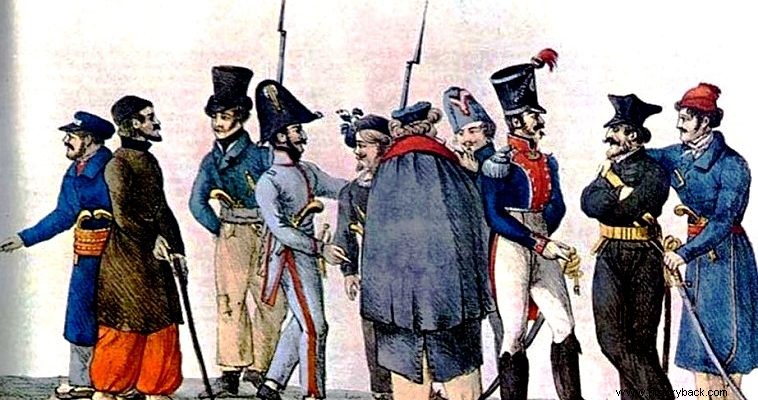
The battle of Peta, on July 4, 1822, was one of the most disastrous for the Greek arms during the Revolution of 1821. But it was also one of the most glorious where the Greek regular soldiers, a few Philhellenes and Iptanesians, fought something more than heroic although they knew that the "barbarians would pass".
In this note, they will refer exclusively to the action of the Philhellenic Corps. In Peta, the Greek regular units captured the center of the line. In the center was the Tactical Corps under the Italian veteran lieutenant colonel – colonel in Greece – Pietro Tarella .
The Heptanisii lined up on the right and on the left the approximately 150 (according to Christos Byzantios, other sources report from 90 to 200 men) Philellenes under the also veteran of the Napoleonic Wars major – colonel in Greece – Italian Andrea Dania (Danias of the Greeks).
The two Philhellenic "companies" were commanded by the Swiss Chevalier and Polish Mirzewski . At the head of this force of about 600 men and 2 light guns was the veteran of the Napoleonic Wars German (from Württemberg) Major General Karl von Norman-Ehrenfels.
These regular divisions supported, having taken positions on the nearby heights, approximately 1,500 irregular Greek fighters. Against them, the Turks gathered about 9,000 men, of which 700 were horsemen. Regular divisions ignored recommendations to erect tambourines with Tarella stating that tambourines are men's breasts. Finally it was decided to build a temporary fortification in front of the regular positions, but this was not ready when the Turks attacked.
The Greek flag... the best shroud
An hour before sunrise, on June 4, the Turks moved towards the Greek positions. Their commander Kiutachis Pasha, he divided his forces into seven divisions, two of which he ordered to attack the Greek miscreants, one he sent to surround the positions of the men of the chief Gogos Bakolas and the rest he ordered to attack the Greek regular divisions.
The battle began with an attack by the Turks against the Phillelenes, but it was repulsed with serious losses for the attackers. Finally the disorderly divisions retreated leaving the regulars to be surrounded by the numerous enemy. Encircled, the Greek regulars charged with their spears against the Turks, breaking the cordon in the direction of the village of Peta. The head of Tactician Tarela was heroically killed fighting. The Tactical lost about 200 men but its remnants managed to escape, supported by Bakola's men.
But where a Homeric battle was fought, it was in the sector of the Philhellenic corps, which were joined by a few men of the Regulars who failed to follow the retreat of the corps. The Philhellenes and the few Regulars formed a small square and for a while they fought furiously against the thousands of Turks. Soul of the struggle was colonel Dania who animated his men by his example. A Turk rushed at Dania on horseback, seizing his horse's bridle. The colonel struck him with his sword but immediately 20 Turkalvans fell against him who cut him down.
12 Poles... a French captain and the German flag bearer
At the same time 12 Poles led by Captain Marzewski they wrote their own epic for the sake of Greece. These brave men were locked up in the church of Ag. Georgiou and fiercely fought the barbarian tribes as long as they had ammunition. Then the Turks entered the church. The fight continued inside with the Poles fighting with spears, with knives, with swords, with fists, with teeth, with tiles from the roof of the temple... They all fell, having covered the floor with dozens of barbarian carcasses. /strong>
The French Philhellenic Captain Moniac , seriously wounded in the leg, without any hope, leaned on the trunk of an olive tree and continued to fight with his sword, cutting down Turks. He kept fighting even when his sword broke. A Turk shot him from behind and when he turned, the enemy's spears fell on him and cut him to pieces. A few Philhellenes took positions on a hill determined to sell their lives dearly! They all fell fighting heroically.
Last, full of wounds from the volleys and swords of the Turks, stood the young German (Prussian from Berlin) Wilhelm Teichmann who was standard-bearer of the corps. With a flag tattered by Turkish bullets in his hands he continued to fight using its pole as a spear. That's how hewas killed ... General Norman, dismembered himself, managed to reach Lagada where he met the initiator of the campaign in Peta, Alexandros Mavrokordatos, and told him:"Everything is lost, except the Honor..." . Norman died a short time later from his multiple injuries.
